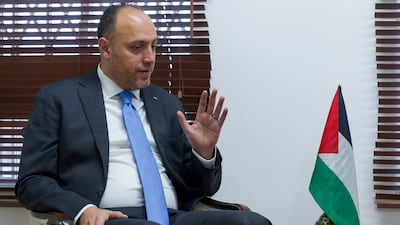British Prime Minister Liz Truss's promise to "review" the location of the British embassy in Israel last month is a burning concern for Palestinians.
Domestic and international criticism rained down on the comment, made by Ms Truss to the Conservative Friends of Israel during her party leadership campaign.
For Palestinian ambassador to the UK Husam Zomlot, moving Britain’s embassy from Tel Aviv to Jerusalem would not only sour UK-Middle East relations, but also upend any viable peace plan.
“Who benefits from this? Will it make Israel more secure? Look at Jerusalem right now, it's almost a war zone,” Mr Zomlot told The National.

East Jerusalem is a part of the West Bank territories which have been occupied by Israel since 1967 in contravention to international law. The withdrawal of Israeli forces is an internationally-recognised requisite of any peace process, including a two-state solution.
“If the prime minister of Britain tells us that she wants to move the embassy then she tells us the two state solution is no longer sponsored by her,” said Mr Zomlot. He was speaking from the offices of the Palestinian mission in London.
“Because if you move the embassy to any part of Jerusalem, it's a tacit recognition of Israel's illegal annexation of East Jerusalem,” he said.
“So I want her to speak out and tell me what the alternative is … because the question is 'if you destroy the two state solution, then do you have a durable sustainable, comprehensive long term plan?' If so, what is it? How will you shift from an occupation that needs to end?”
Mr Zomlot said Ms Truss is veering away from growing sympathy for the Palestinian cause among the British public and politicians, even among the traditionally Israel-supporting Conservatives.
He says the move only represents Israeli interests “from a very certain right wing extreme perspective”.
From condemnation by former British foreign secretary William Hague to the concerns of Gen Sir Simon Mayall, the UK government’s former chief Arab adviser, and a chorus of dismay from church leaders, Ms Truss has been left isolated.
“Regrettably, the engagement has only been between the prime minister and a certain extreme maximalist side of the Israeli lobby here,” said Mr Zomlot. “I don’t think this is the view of the British government but rather just its head.”

The occupied city itself is currently engulfed in a wave of violence between Israeli forces and Palestinians in a besieged refugee camp in East Jerusalem.
Unrelated to Ms Truss statements the tensions demonstrate the incendiary effect of anything that touches the Holy City without regard to the overall Palestine-Israel conflict.
Echoing the worries of others in Westminster, the diplomat said the international impact of the UK, a permanent member of the UN Security Council, breaching one of its own resolutions would be “completely disastrous”.
“To see the impact on the UK vis-a-vis its role in the region and the peace process, to see the impact on the church and the Christian community in Jerusalem … it’s huge,” he said.
“I hope this does not indicate the end of the establishment and institutions, and the checks and balances that the UK is renowned for, and the beginning of more transactional politics.”
Israeli Prime Minister Yair Lapid and Ms Truss have agreed to establish teams to negotiate a free-trade deal as quickly as possible, but that may come at a cost.
Earlier this month a senior Conservative told The National that Arab leaders were ‘baffled’ by the developments with both Israeli and Gulf figures fearing the effects of an embassy move on the Abraham Accords, the agreement signed in 2020 to promote greater understanding between Israel and the UAE and Bahrain.
It comes at a particularly sensitive time as the UK and Gulf Cooperation Council countries are in the middle of negotiating a multi-billion dollar free trade agreement.
Given the significance of Jerusalem in Muslim countries — it is where the Masjid Al Aqsa, Islam’s third holiest site, is located — Mr Zomlot says signatories to the Accords cannot be happy to see their agreement “abused and exploited”.
“I'm sure that was not the purpose of that agreement,” Mr Zomlot told The National.
“A move serves nobody and it only entrenches division, it only creates further tensions. It presses the wrong buttons in terms of religious confrontations. No-one needs this at this point in time.”


